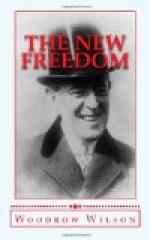The moment the forces in New Jersey that had resisted reform realized that the people were backing new men who meant what they had said, they realized that they dare not resist them. It was not the personal force of the new officials; it was the moral strength of their backing that accomplished the extraordinary result.
And what was accomplished? Mere justice to classes that had not been treated justly before.
Every schoolboy in the State of New Jersey, if he cared to look into the matter, could comprehend the fact that the laws applying to laboring-men with respect of compensation when they were hurt in their various employments had originated at a time when society was organized very differently from the way in which it is organized now, and that because the law had not been changed, the courts were obliged to go blindly on administering laws which were cruelly unsuitable to existing conditions, so that it was practically impossible for the workingmen of New Jersey to get justice from the courts; the legislature of the commonwealth had not come to their assistance with the necessary legislation. Nobody seriously debated the circumstances; everybody knew that the law was antiquated and impossible; everybody knew that justice waited to be done. Very well, then, why wasn’t it done?
There was another thing that we wanted to do: We wanted to regulate our public service corporations so that we could get the proper service from them, and on reasonable terms. That had been done elsewhere, and where it had been done it had proved just as much for the benefit of the corporations themselves as for the benefit of the people. Of course it was somewhat difficult to convince the corporations. It happened that one of the men who knew the least about the subject was the president of the Public Service Corporation of New Jersey. I have heard speeches from that gentleman that exhibited a total lack of acquaintance with the circumstances of our times. I have never known ignorance so complete in its detail; and, being a man of force and ignorance, he naturally set all his energy to resist the things that he did not comprehend.
I am not interested in questioning the motives of men in such positions. I am only sorry that they don’t know more. If they would only join the procession they would find themselves benefited by the healthful exercise, which, for one thing, would renew within them the capacity to learn which I hope they possessed when they were younger. We were not trying to do anything novel in New Jersey in regulating the Public Service Corporation; we were simply trying to adopt there a tested measure of public justice. We adopted it. Has anybody gone bankrupt since? Does anybody now doubt that it was just as much for the benefit of the Public Service Corporation as for the people of the State?




